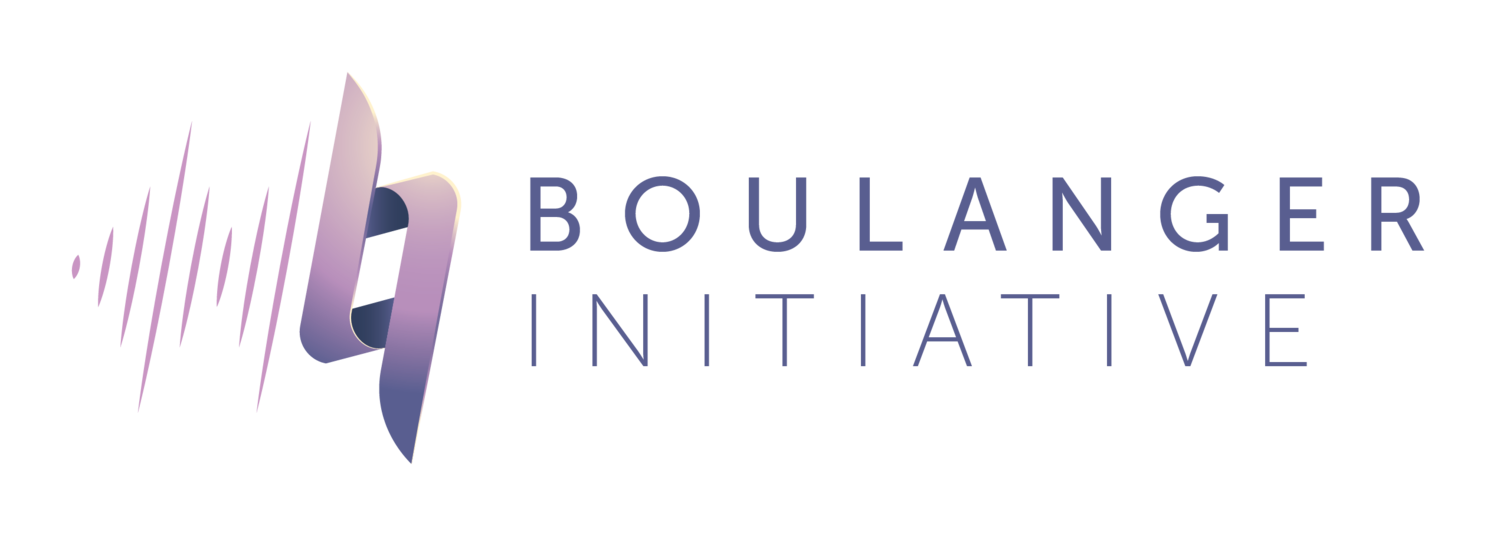Join us for Boulanger Initiative’s October Virtual Course “Building an Inclusive Practice: A Toolkit for Music Educators and Performers.” This series of 6 workshops will empower attendees to create a comprehensive, holistic, dynamic, and inclusive environment, whether for their students, their colleagues, their audience, or themselves. We will facilitate discussions of relevant topics in music education and research, provide resources for further learning, and share methods to make a tangible impact in the realms of allyship and activism. You will leave this course feeling confident in your ability to diversify repertoire and curriculum with intention and care, setting a stage for future practices that are reflective of all who participate and engage in the world of music. Course registrants will also receive access to the videos of each session until the end of the year.
Registration includes a 50% discount on digital editions of BI’s curriculum series.
Cost:
Registration for All 6 Sessions: $199
Students: $99
OR
Individual Sessions: $40
Student Individual Sessions: $20
Financial Aid Available
If you wish to register for individual sessions, scroll down.
Schedule
Courses are Thursdays from 5:30pm – 7:30pm Eastern.
| Week | Date & Session | Time (ET) |
|---|---|---|
| Week 1 | : Discovery Workshop – Where are the Women | 5:30–7:30pm |
| Week 2 | : Research 101 – Finding the Music | 5:30–7:30pm |
| Week 3 | : Beyond Florence Price – Composers of Color You Should Know | 5:30–7:30pm |
| Week 4 | : Creating Original Music as a Tool for Change | 5:30–7:30pm |
| Week 5 | : Curation 101 for Programmers, Performers, and Music Educators | 5:30–7:30pm |
| Week 6 | : Daily Musical Activism & Allyship in the Classroom and on the Stage | 5:30–7:30pm |
Course Details
Discovery Workshop: Where are the Women? (Oct 16)
How many women composers can you name? Wondering why you don't hear more music written by women at concerts? This session examines why, in the 21st century, the classical music industry is still not inclusive of music by women. Discover how we got here, what needs to be done, and what you can do to create a more level playing field for the future of classical music.
Research 101: Finding the Music (Oct 23)
In this workshop, attendees will learn a myriad of physical and digital resources and methods to discover new repertoire and composers and enhance their knowledge of music history. Our research workshop focuses on the how, where, and why behind the research. This session covers early stages of starting research, including where to begin finding resources and how to use both physical and digitized materials in libraries, archives, and beyond. We will dig into how different resources are valuable and how they can be applied to different practices and paths including finding repertoire, researching composers, and everything in between.
Beyond Florence Price: Composers of Color You Should Know (Oct 30)
In this never-before-seen workshop from Boulanger Initiative, we are going to share with you a host of “deep-cut,” non-white women composers; equally worthy of study and performance as the relative monolith of Florence Price, we will take you on a journey from the Renaissance into the 21st-century with composers from around the world. This session will serve as a next step for utilizing the skills from Research 101 for educators and musicians looking to expand repertoire and put them into use in your own classrooms and performance practice.
Creating Original Music as a Tool for Change (Nov 6)
This session goes in-depth into why creating original music is important for learners, educators, and performers alike, and will include a hands-on activity that will help unlock your inner creative. We’ll ask questions like “What is a composer?” and “What stories and cultures need to be represented today?” We’ll explore which genres and instruments participants think best represent these issues and what method of composition is most suitable (written, aural, etc.) and how exploring the practice of creating original music empowers the individual as well as works to expand the canon and curriculum that have been hallmarked by erasure. There will be examples of transformative music through history with discussion of why this music was important and how it affected change. The session will culminate in participants utilizing the techniques gained in this course and beginning to write your own music for change.
Curation 101 for Programmers, Performers, and Music Educators (Nov 13)
The follow-up to our Research 101 workshop, this session focuses on how to use your new research skills to find repertoire and begin creating a program of great music! We will learn about inclusive programming, intentionality, and things to consider when building variety into programs and performances. We include activities to engage participants in learning about underrepresented composers and creating their own programs for your instruments.
Daily Musical Activism & Allyship in the Classroom and on the Stage (Nov 20)
The final session of this course will recap the skills and tools gained from all workshops, and engage in discussion of how to put these into practice in our daily lives. In this workshop we will tackle the question “But what can I do?” when facing inequity and injustice in the music industry, how to work from within and without existing and evolving systems, especially those that are restrictive. From performance practice to scholarship, and from academia to beyond the world of formal education, you will leave this session armed with a variety of ways to stay involved and make meaningful and lasting change.
